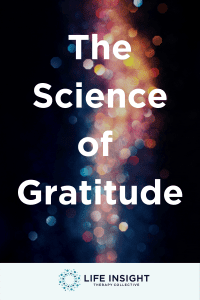The Science of Gratitude
Gratitude is not just a cultural construct. According to a white paper by the Greater Good Science Center at UC Berkeley, it has roots in our evolutionary history, our brain chemistry, our DNA, and in child development.
Origins
Many animal species have been observed practicing a way of “reciprocal altruism” – helping another member of their species at a cost to themselves. Studies show chimpanzees are more likely to share their food or help with a task when that chimp helped groom them earlier. This rudimentary example of gratitude and “paying it forward” shows that animals have used gratitude as an evolutionary benefit to ally with others.
Our Brains
Neuroimaging studies have made note of areas of the brain associated with experiencing and expressing gratitude including regions associated with feelings of reward, social bond formation, interpreting other’s intentions, moral cognition, and perspective-taking. These studies suggest that experiencing gratitude feels rewarding, is inherently social, and involves assessing others’ morality.
A Study on the Impact of Gratitude
Gratitude is seen to have positive mental and physical benefits to everyone who practices regularly. The positive effects are not limited to mentally healthy people, either. A study was done to compare three groups of people, all experiencing low levels of mental health who were about to begin counseling for depression or anxiety.
One group was asked to write a gratitude letter to someone in their life each week for three weeks, one group kept a journal, and one group was not asked to write. All three groups received counseling during the study.
The study found that the group who wrote gratitude letters reported significantly better mental health four and 12 weeks following the study compared to the two other groups. They also used more positive emotion words in their writing than the journalers did, suggesting that gratitude letter writing actually shifts us away from negative thoughts and toxic emotions.
You Don’t Have to Send It.
Only 23% of people in the letter-writing study actually sent their letters to the intended recipient, but all letter writers experienced the mental health benefits of practicing gratitude through letter writing.
We hope this encourages you to give gratitude letter writing (or journaling, or speaking out loud) a try. The practice of gratitude is central to our experience as humans, and the benefits are lasting.
“None is more impoverished than the one who has no gratitude. Gratitude is a currency that we can mint for ourselves, and spend without fear of bankruptcy.”
—Fred De Witt Van Amburgh
Join Our Community.
Sign up for our quarterly newsletter with practice news, timely resources, staff highlights, and other helpful tidbits!
Recent Posts







